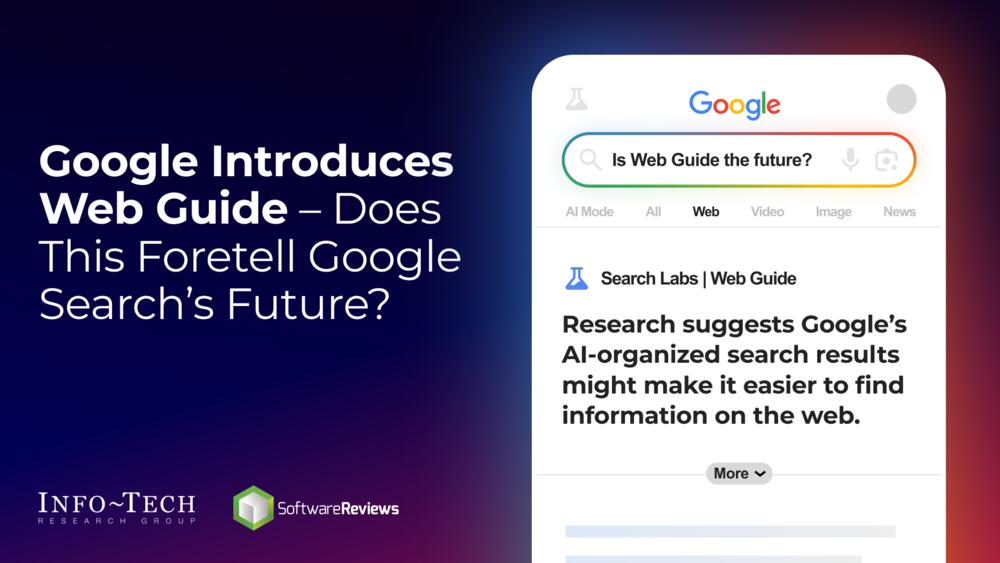Google Introduces Web Guide – Does This Foretell Google Search’s Future?
On July 24, 2025, Google announced a new view of Google Search called Web Guide that is available for Google users who have opted into Google Search Labs. Google Search Labs is an opt-in for users to sign up for access to Google experiments. Web Guide organizes the search results using AI, giving you more detailed and contextual results for your query.
As part of my work at Info-Tech, I advise members on their web presence, digital footprint, and go-to-market strategy; so far, I am thrilled with this Google experiment.
I tested this new Google Web Guide Feature with several queries, and my first impression is that this feature gives you an excellent dossier on a person, organization, service, or product.

Google’s prominence signal gets more importance in this search view. Prominence is what other sites say about you including news websites, social media, review sites, and employee ratings.
I am using a search of my own name to illustrate the different components of the Google Web Guide results.

Source: Google Web Guide
I am impressed by the top results that show where I engage the most – LinkedIn, where I post multiple times a week, and of course my profile at Info-Tech, where I write research. This is similar to the standard Web results of Google. I can toggle between Web Guide and standard Web.

Source: Google Web Guide
Since the search query is identified as a person by AI, the next section is Professional Profiles, again very similar to standard Web results with a big difference: this is now labeled and easy to read. If you are more well known, you could get a “Summary” and section titled “Professional Overview” or “Biographical Information and Career Overview.”

Source: Google Web Guide
Google has always used social media posts as a signal of the prominence of a search subject. Results from social media come up on Google’s current standard search and in the Web Guide for both people and organizations. My social media is on target for what I want to be known for.

Source: Google Web Guide
This is a section from previous speaking engagements. As Google Web Guide AI makes the results dynamic and personalized. you may see sections like “Interviews and Content” or “Published Articles.”

Source: Google Web Guide
I love this, I have been blogging for over 20 years and am happy that Google identified my personal blog even if I am not posting there frequently. This result will add trust and validation for people looking for me and add to my Expertise and Experience signal with Google, which is a great signal for my web presence.

Source: Google Web Guide
This is in my opinion, tongue-in-cheek AI, but I was thrilled to see this section for my results and this is spot on.
Our Take
While this is experimental and part of the Google AI Labs initiative, there are strong indications that this will be the shape of things to come. To have a well-composed search profile in the Web Guide and the form that this takes in the future, companies need to follow the principles of conveying their Expertise, Experience, Authority, and Trust (EEAT). These are Google’s guidelines.
Companies should consider ways to showcase the expertise of people working for them to assure prospective customers. Having a wide digital footprint is important and smarter marketing teams use multiple media and channels to be in front of prospects. Not publishing regularly with high-quality content is another negative signal for not only Google but also other AI-powered search engines. Prepare for a future where you hold the key to your Google results. Produce good content, engage in multiple channels with your audience, and be strategic. We see this Google experiment making it into the mainstream in the next few versions of Google search. The Web Guide is friendly, saves time, and gives users a good comprehensive answer on the search topic. Organizations need to plan to be part of the Web Guide results.
